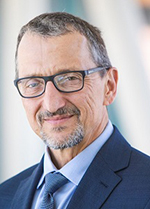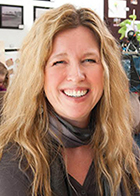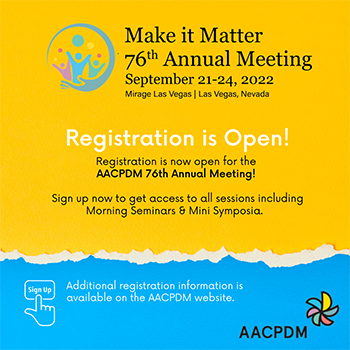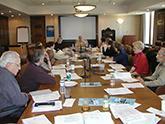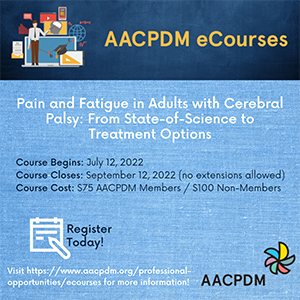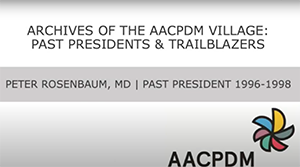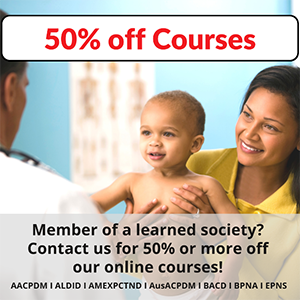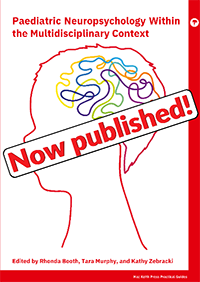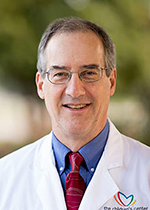
AACPDM President’s Message
I was encouraged by Dr. Jim Gage to attend my first AACPDM Annual Meeting in 1991. Sarah Winter and I had just joined the staff at Gillette Children’s that summer. As newbies, we did not know many other people. In addition to getting to know each other better (on the tennis court!), a memorable and life changing occurrence was that prominent people in the field such as Martin Bax, Peter Blasco, and Al Schertzer took time to say hello. Those experiences combined with the number of high quality sessions and scientific rigor of the conversations hooked me for life. As a result of my work with the Academy, and those personal connections made yearly at the annual meeting, I am fortunate to have friends and colleagues from across North America and the world who I can connect with if I have questions, want to discuss collaboration, or need to refer an individual for care. The AACPDM is my professional home because we serve our patients across the spectrum of their needs, and the annual meeting is the only one where you can reach a physical therapist who heads a pediatric rehab program, a chief physician of a hospital neuromotor program, an occupational therapist who purchases equipment for a clinic to help their patients, or a neurologist or developmental pediatrician who researches the effectiveness of a new therapy. I look forward to engaging with many of you in Las Vegas in September. Together, we can "Make it Matter!" Be well. Stay safe. |
|||||||
|
|
First Vice President's UpdateRegistration is Open! Our planning team would be thrilled to welcome you to Las Vegas for the American Academy for Cerebral Palsy and Developmental Medicine (AACPDM) 76th Annual Meeting. The meeting program is full of outstanding research and educational sessions including over 200 scientific presentations, 25 morning sessions and 36 mini-symposia. We are excited about the diverse group of keynote speakers and we hope you will be to too!
We hope all of you will join us at the Welcome Reception in the Mirage main exhibit hall 6:00-7:00 pm on Wednesday September 21. You will not want to miss the dance performance by Jerron Herman and the opportunity to re-connect with your friends and colleagues. If you are a new member and are considering joining a committee, you would like to be more engaged with AACPDM or if you not a member and are considering membership, please join AACPDM Committee Chairs and members of the Board of Directors in the Main Exhibit Hall one hour prior to the Welcome Reception for an informal Meet and Greet Reception. Throughout the meeting, the Adapted Sports and Recreation Committee will keep us energized with their ‘Let’s Move’ sessions. The Friday evening networking dinner and celebration will take place at the breathtaking Keep Memory Alive Event Center. Take in Frank Gehry’s stunning architecture as you enjoy dinner catered by Wolfgang Puck’s culinary team. This innovative event center supports research and clinical care at Cleveland Clinic Nevada and the Lou Ruvo Center for Brain Health. We know this will be a fun evening and a wonderful opportunity to celebrate being together again. We hope to see you there!
Past President Reflections
|
||||||
|
Figure 1. Mike Kabo, PhD maintains the AACPDM Online Booth at an annual meeting in the early 1990's Members were invited to log on to the internet and our website and given the opportunity to do so. Note the original Logo of the AACPDM.
Figure 2. Dylan Schiemann, then CEO of SitePen, helps a member get introduced to the Internet and the AACPDM Website. Circa 2000
Figure 3. Current Homepage of AACPDM.org
Figure 4. 1st Webmaster W.Oppenheim with Dylan Schiemann, CEO SitePen. Dr. Oppenheim launched the website; Dylan’s company developed it a demonstration site to help promote their new company.
Figure 5. Early 2000’s BOD with President Mike Sussman, MD. Other identifiable members include: Virginia Nelson, MD, Helen Horstman, MD, Annette Manjeme,OT PHD, John Montavani, MD, James Blackman, MD, Greg Liptak, MD, Bob Christopher, MD, Murray Goldstein, MD. They presided over the formative stages of the website. |
Early Origins of the AACPDM Website, the UCLA Contributions, and the Role of the Cheesecake Factory Over the past two years, most of us have become accustomed to real-time Zoom conferencing, along with the problems that go with it, including a new phraseology such as “you’re muted” or “can you hear me now?” We take for granted being able to do this on our phones, tablets, and desktop devices, often engaging over a wireless connection. We conduct surveys, polls, and elections virtually. We order merchandise and dinner and make travel reservations online. We have dedicated Annual Meeting Apps that help us organize and trim offerings to our specific interests and interact on an audience level in real-time with the presentations. Today’s children grow up with this technology, and there is no need to convince them of the usefulness of the technology or the steps necessary to go online. Return to a time not long ago when there was no AACPDM website, not to mention computers, the internet, cell phones, Wi-Fi, or online shopping. That would be the mid-1990s, as the Academy was fiscally challenged when the idea of an AACPDM website was first brought to the Board. This resulted from of a document produced by the “Long-Range Planning Committee” as part of the first strategic planning our organization undertook. The document anticipated a need for an enhanced communications capability, primarily by centralizing resources to make them easier to share. A website was an afterthought primarily for the benefit of the public and patients. Because organization websites were just coming into use, the Board of Directors (BOD) was mostly unfamiliar with the concept. It took two years of lobbying to persuade the Board to register the site name and to get permission to proceed. They initially did not want to take the risk. Still, eventually, a few Board members who were using the internet for research spoke up in favor, and the website was preliminarily approved. There was no budget, nor were there any hosting facilities to construct the initial site. A program called Microsoft Front Page, rudimentary by today’s standards was selected. The Webmaster spent many evenings typing up items to be posted. In those days, nothing was recorded nor stored electronically. Word processors were still a novelty in many places, so this was a painless way for Committee Chairs without secretarial assistance to get the minutes typed up and distributed to their members for eventual discussion by phone. These are what formed the initial postings on our website. There was no staff to attend to these matters; remember that we were still emerging from the equivalency of bankruptcy. Up to the establishment of “AACPDM.com,” only handwritten notes were kept in folders/binders and passed from one Chair to another at the Annual Meeting. Mike Kabo, Ph.D., a UCLA Bioengineer, agreed to host the site on his server in the UCLA Department of Orthopedics. He became a good friend, attending our annual meetings and setting up a booth to introduce members to the new technologies. After a few months, we had a website. Nothing came easy at this stage. The Webmaster recalls one evening spent creating identical electronic buttons differing only by color so that a mouse-over would appear to illuminate the button, and a click would seal the selection. As Steve Jobs said, 'that was hard.' Primitive does not do justice to the nativity of the project. Given that the webmaster's only qualification was a computer science course 25 years ago, utilizing IBM punch cards on a mainframe computer available to students onsite from 12:00 AM to 3:00 AM. The real breakthrough came when a Cheesecake Factory Restaurant opened a few blocks from where the site was administered. It was only the second one in the country, and the Webmaster considered investing in their stock. While researching the restaurant, he ran into a site maintained by a UCLA Physics Master's candidate, which contained menus and other helpful information. He contacted the site creator, not knowing that their workplaces were just five minutes apart. Eventually, they met and discovered that the new grad planned to partner with a graphic arts startup in Florida and form an internet company to host websites. He suggested they take over the technical part of the AACPDM site for free to start their company while upgrading our online presence and brand. No contract, no BOD approval, no budget. The company they formed, called SitePen, is still in existence. Their initial office was a two-bedroom apartment in Santa Monica, CA, with six graduate students and many computer screens. Dylan Schiemann became a tech pioneer who, among other things, developed the Dojo language as a supercharged form of JavaScript, which now does everything from language translations to databases and beyond. The BOD was notified that an upgrade was in progress, that it would not cost anything, and thus they agreed to let SitePen host the site on their secure high-speed servers. Throughout this period, Dylan and SitePen attended AACPDM meetings, introduced the Internet, and offered in-person training. Courses were offered in word processing, PowerPoint, accessing the internet, and many others, which proved very popular, particularly with the older Academy members. As the AACPDM became more prominent and sophisticated, the Academy moved to more suitable management companies with their own in-house IT groups. But SitePen persists today with a client list that includes Fannie Mae, JPMorgan, Bristol Myers, Intuit, Liberty Mutual, and Marriott, among others. In the early days of the website, developing posting material was an issue. Aside from Committee Reports, we converted what teaching materials existed to simple posts, such as suggested parent reading lists. We established hypertexts (electronic links) to other websites’ materials, and even though we gave proper credit to the sources, we were threatened on one occasion with a lawsuit. The age of electronic intellectual property was upon us! No real concern: the site quickly developed an international following. Once more sophisticated materials were added, we became the International leader in the field which helped to promote our Annual Meetings. By 2002, after tens years in operation, over 5,000 people were logging on generating many thousands of requests for unique pages of materials each month. Susan Sienko Ph.D., our current Past President, took over the website in 2007 and remained the webmaster until 2017. It was decided the website be redesigned to allow for easier navigation. A company was engaged to design a new user-friendly website, giving it the updated look and feel that we essentially have now. A website committee including Harriet Fain-Tyedt, Lynne Romeiser Logan, Kate Doughty, and Maurice Sholas was formed and tasked with reviewing the old website and determining the pages to remain on the website. The website committee was responsible for manually testing every link on the website to ensure they were still valid and worth including. Changes at that time were tedious because they needed to be collected and routed through the programmers to execute. Much has changed since these times, and many routine changes to the website are within our control. Our newest Webmaster is Julianne Sees, DO, FAAOS, who has assumed day-to-day management under the aegis of the AACPDM Communications Committee. The website is currently experiencing about 1000 visitors per month, representing over 50 countries. Footnote. The other contribution of UCLA.Looking at the timeline of the “WWW” commercialization combined with the development of the technology, the AACPDM was very much both a pioneer in the early stages, and an emerging leader even today. A story of which all members can be proud. This article was prepared by the Historian who was the first Webmaster and lived to tell about it! Thanks to Dylan Schiemann who located some of the pages from the older sites, and to Hank Chambers, Susan Sienko, and Julieanne Sees who provided input. Notes of the Website Committee Minutes were utilized as well. The author is shown with Dylan Schiemann in Figure 4. Figure 5 shows one of the presiding BOD during the period covered circa 2001. References: |
||||||
|
Committee UpdatesComplex Care The Complex Care Committee is a broad, multidisciplinary committee that has been active in addressing goals that align with the AACPDM mission over the past few months. One key objective relates to the dissemination of important clinical management updates for children and adults with medical complexity. This is being accomplished in multiple ways. Work has included the conversion of past AACPDM conference material to enduring e-course content including respiratory care management and pain management updates for those that are medically complex. For the upcoming AACPDM annual meeting, our committee has adopted the “Make it Matter” theme by exploring collaboration between health care and educational providers with a course titled “Schools as Members of the Complex Care Team.” We are looking forward to meeting with others in the Academy in person in Las Vegas where our Complex Care Track will allow for dynamic learning and networking. Have a wonderful summer and we will see you there! Education The Education Committee continues to offer self-paced online eCourses for CME and CEU credits. This year, in collaboration with AACPDM members, the committee successfully launched the following courses:
We encourage members to attend and share the current eCourse, available until September 12, 2022, Pain and Fatigue in Adults with Cerebral Palsy by Debbie Thorpe PT, PhD; Heidi Haapala, MD; Marij Roebroeck , PhD; Mark Peterson, PhD, MS; Elisabet Rodby Bousquet PhD, PT; David Frumberg, MD; Caitlin Cassidy MD, FRCPC; and Brooke Larabee. Lifespan Care The Lifespan Care Committee has been working hard on a few major projects this year. We're very excited to let you know that our Lifespan Journal Digest is now available on the AACPDM website! Please remember to visit the site regularly to check for our quarterly updates summarizing important research in the area of Lifespan care for people with childhood onset disability. Members of the Committee also took on the task of organizing and preparing an e-course, titled "Pain and Fatigue in Adults with CP: From State-of Science to Treatment Options," which will be open as of July 12. Finally, the Committee continues to support the ongoing operation of the Adult and Aging SIG. The SIG planning committee (comprised of Committee members and non-members) is looking forward with great anticipation to only our second in person meeting in Las Vegas, and we hope that many of you will come and join us there! Membership The membership committee has selected the 2022 scholarship recipients for the OrthoPediatrics Travel Scholarship. This scholarship funds travel for AACPDM members who are Residents/Fellows in training, Physicians in their first year of practice, and Allied Health professionals (nurses, physical, occupational, speech, and recreational therapists) who are at any point in their career. Congratulations scholarship winners! The membership committee will be launching quarterly roundtable discussions for new members, with the purpose of increasing engagement and promoting networking. Proposed topics include how to engage as a new member, benefits of joining a committee, information on applying for scholarships and grants, as well as tips on how to collaborate with authors to submit a course for the annual meeting. Our first discussion will be in August 2022. Join us on Wednesday, September 21, 5:30-6:00 pm for a Meet & Greet!The meet-and-greet will be held in the Poster and Exhibit Hall and all Committee Chairs/Chair-Elects and AACPDM Board Members are asked to attend. Invitees will have the option to mingle with committee leadership and learn more about your work, expand their AACPDM network, and explore increased engagement with the Academy. Each committee will have a table and Committee Chairs/Chair-Elects are asked to attend and represent their group. Handouts are welcome but must be created and produced by each committee. Research The AACPDM Research Committee completed the reviews of 22 grant proposals and is waiting on funding decisions. We appreciate the generosity of our partners, Pedal with Pete, C-Progress, and the Cerebral Palsy Alliance Research Foundation, for the funding they offer and the applicants for the excellent proposals they submitted. To enhance the review process, we successfully piloted a new procedure meant to offer funders more extensive reviews and applicants more extensive feedback than during prior cycles. We thank everyone involved. The Research Committee is also planning the research-focused pre-conference course “Establishing a Research Program Focused on Cerebral Palsy or Other Child-Onset Developmental Disabilities: Transitioning from an Early-Stage to an Independent Investigator.” The course will be offered on September 21, 2022 from 8:00 am to 12:00 pm as a preconference of the 2022 Annual Meeting. Please note that the National Institutes of Health (NIH) is hosting a workshop on cerebral palsy research on August 17 and 18: https://grants.nih.gov/grants/guide/notice-files/NOT-NS-22-105.html. The Research Committee worked with the board of directors to contribute comments to the NIH's Request for Information (RFI). Adapted Sports & Recreation Committee The AACPDM Adapted Sports & Recreation Committee has been hard at work this year! Committee members continue providing concise summaries of recent adaptive sports original research articles via the Adaptive Sports & Recreation Journal Article Digest, so that busy AACPDM members can keep up with recent evidence-based literature. Our committee has also increased its focus in promoting diversity, equity, and inclusion efforts related to adaptive sports and recreation, including highlighting different organizations, resources, or events. Committee members have also been thoughtfully planning sessions for the AACPDM Annual Meeting, including multiple “Let’s Move!” physical activity sessions and the adaptive sports and recreation community forum session. We hope to see many members at our sessions at the Annual Meeting in Las Vegas! Advocacy The Advocacy Committee has been busy this year! Our current exciting projects include building a reference toolkit on the AACPDM website that provides members with the information they can use to advocate for their patients at the healthcare, state, and national level. We plan for this to go live on the website in 2022 and it will be updated regularly. We continue to collaborate with the AACPDM Community Council to identify the needs of persons with disability as well as their families, and will again coordinate an Advocacy Panel for the Community Forum this year. The Advocacy Committee will also present a mini-symposium that we would like to present at the 2022 Annual Meeting to be held in Las Vegas focused on various advocacy topics. Finally, we continue to identify important current issues or initiatives that are relevant to the membership. After a vetting process, we relay these to the communication committee for dissemination to the membership. Care Pathways The Pathways committee has been meeting regularly to review topics important to the development of Pathways. We are very excited to have the first Pathway completed with the new methodology. Darcy Fehlings and the Dystonia group have done a great job. The Pathway will soon be up for public comment on the Pathways committee page for 30 days. Please take this opportunity to look through it and ask questions or make comments. The Respiratory Pathway is also newly up on the website and was completed using the original methodology. The committee has at least 2 liaisons for each Pathway under development to assist the teams in using the new methodology and ensure communication between the teams and the committee. We also are using this opportunity to get new members of the committee intensively involved in the development process of a Pathway. We encourage you to consider the preconference to be held on September 21 at the 2022 Annual Meeting in Las Vegas entitled, “PC5: Quality Matters: How to Evaluate a Systematic Review of Intervention (And Learn to do a Good Quality One)”. Communications The Communications Committee works to utilize coordinated strategies to disseminate AACPDM announcements and updates across several different platforms to promote its overall mission. We use Facebook, Twitter, and Instagram as our key social media platforms and create our society newsletters. Our goal is to not only inform our members and the public of our society’s work, but to also promote research, tech, disability awareness and rights, and more!
Community Council The primary purpose of the AACPDM Community Council is to provide the voice of lived experience from a variety of stakeholders to enhance the mission of the AACPDM. Our goals include pursuing opportunities to collaborate for the health, wellness and support of those with Cerebral Palsy and other childhood-onset disabilities. We are excited to welcome Benjamin Shrader from Delaware, and Amy Cutler from Illinois as new members to the Community Council! The Council has identified a Family Track to provide recommendations on family centered sessions during the AACPDM Annual Meeting. All final tracks will be available on the Annual Meeting website here: http://www.aacpdm.org/events/2022 The AACPDM Community Council hosts an annual Community Forum, which is a FREE educational event for families and individuals with cerebral palsy or other childhood-onset disabilities. We invite you to explore these events by visiting here: http://www.aacpdm.org/get-involved/community-forum. The 2022 Community Forum is excited to announce that we will be virtual again this year to best accommodate the travel needs of families. Stay tuned for the registration notice. We will release one panel a day from September 12-15. The four panel topics will include: Elements of Data from NINDS
Submitted by: Joline Brandenburg, MD, Chair, CP CDE Oversight Committee & Carolina Mendoza-Puccini, MD, NINDS CDE Program Officer, National Institute of Neurological Disorders and Stroke (NINDS), National Institutes of Health (NIH) The public review and comment period for the drafts of the NINDS Cerebral Palsy Common Data Elements (CP CDE) Chronic Pain Instruments and Orthopedic Case Report Forms closed on June 1. Thank you to all who reviewed and provided feedback. We are in the process of reviewing the feedback, updating the instruments and forms, and providing responses to those who submitted comments. The Chronic Pain Instruments and Orthopedic Case Report Forms will be published in August 2022. These will be the newest addition to the NINDS CP CDEs Version 1.0. We encourage all to visit the website and provide feedback. The CP CDE Oversight Committee uses the feedback to facilitate reviewing and updating the CP CDEs. For all attending the 2022 AACPDM Annual Meeting in Las Vegas Nevada, the CP CDE Oversight Committee is delighted to be able to share more information on the CP CDEs and the most recent updates. On Friday, September 23 from 4:00 to 6:00 PM we will be presenting “Pain Matters! NINDS Cerebral Palsy Common Data Elements, International Classification of Functioning, and Measures of Pain in Children with Cerebral Palsy.” On Saturday, September 24 from 8:15 to 9:15 AM we will be presenting “NINDS Cerebral Palsy Common Data Elements for Lower Extremity Orthopedic Interventions.”
Introducing Archives of the AACPDM Village: Past Presidents & TrailblazersA project intended to preserve the stories from the past to help share the future of the AACPDM. In celebration of the AACPDM 75th Anniversary, last year the Academy launched a new video series highlighting those who have made a difference in Academy history: Archives of the AACPDM Village: Past Presidents and Trail Blazers. This video series now features seven Past Presidents each of whom contributed to building the AACPDM village in unique ways. Through their stories, we are reminded of the many different personalities and characteristics that make up a village, and how each contributes to the multidisciplinary and interdisciplinary vision of the Academy. Each of these Past Presidents learned from each other, grew together, and often developed lasting friendships. Their stories frequently intermingle, and we learn that each cares deeply about this Academy, their fellow members, and the patients and families this Village was built to support. Click the image to watch a preview of the latest addition to the Archives of the AACPDM Village: Past Presidents and Trail Blazers video series, Peter Rosenbaum, MD. Please visit the AACPDM website to watch all of the full length Past President interviews. Mac Keith Press Update
June Highlights from Mac Keith Press New AACPDM members area and course offer We are in the process of building a dedicated AACPDM members page on our website which will highlight key content and free material that will be useful for AACPDM members. Do you have any ideas about other content you’d want to see? Please let us know at admin@mackeith.co.uk We're pleased to offer 50% off our online courses for AACPDM members! Contact the team by email or by clicking the image. Paediatric Neuropsychology within the Multidisciplinary Context Rhonda Booth, Tara Murphy, and Kathy Zebracki present exciting new critical insight on neuropsychological theory and its influence on clinical practice in this accessible and forward-looking publication. With new research and theory on brain-behaviour relationships supported by instructive case studies, this Practical Guide demonstrates how neuroscience and other important factors are driving clinical formulation in paediatric neuropsychology. Key papers this month: This article compares the societal financial costs and quality of life of untreated spinal muscular atrophy (SMA) patients and treated patients identified because they presented symptoms or were identified by early testing (sibling or newborn screening). Dangouloff et al. found that early identification and treatment offers the opportunity to reduce total societal costs of SMA where treatments are available for pre- and post-symptomatic patients. This overview of reviews by Franz et al. synthesizes early intervention literature for very young children with or at high likelihood for autism spectrum disorder to identify which interventions are supported by evidence and the quality of that evidence. Lived experiences of adolescents with fetal alcohol spectrum disorder Through semi-structured interviews, Skorka et al. explored the lived experiences of adolescents with fetal alcohol spectrum disorder (FASD) to understand the ways in which their challenges influence daily functioning and participation. They argue service providers should consider incorporating strengths-based approaches with an explicit focus on facilitating the development of positive self-identities to better support adolescents with FASD. Remember to check out Early View for the very latest from DMCN. Letter from the EditorGreetings and welcome to mid-summer. It is hot here, 102-103°F (38.5-39°C) and increases appreciation for technology to manage the temperature indoors, as well as appreciation for the added difficulties of the mobility impaired. Technology has provided amazing benefits (and problems) and one wonders what additional technology is coming in the future. Technology has also allowed us to communicate when not physically present. We hope to see you at the 76th Annual Meeting and explore what can be done, or is in development, for yourself! Blessings and peace to you.
Steve Couch |
